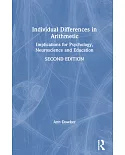At first it may appear that practitioner and journalist Freed (clinical psychology, Stanford U.) advocates combining incompatible treatments. However, as he points out in a well-reasoned
introduction, therapists practicing analytic construction tailor each patient's treatment to meet the ever-changing clinical needs of the individual and make changes or modifications as often
as necessary. This high level of attention to patient needs results in significant improvements by patients who can appreciate the philosophy and science behind each of the therapies and the
overall intention of analytic construction, which is to enable recovery rather than to prove theory. Freed describes the philosophy and science behind the practice, methodology, theoretical
constructs and themes now emerging in the approach, and case studies. He also outlines new avenues of research in this relatively new form of attempting to understand the human mind in travail
and offer real help. Annotation 穢2009 Book News, Inc., Portland, OR (booknews.com)





















